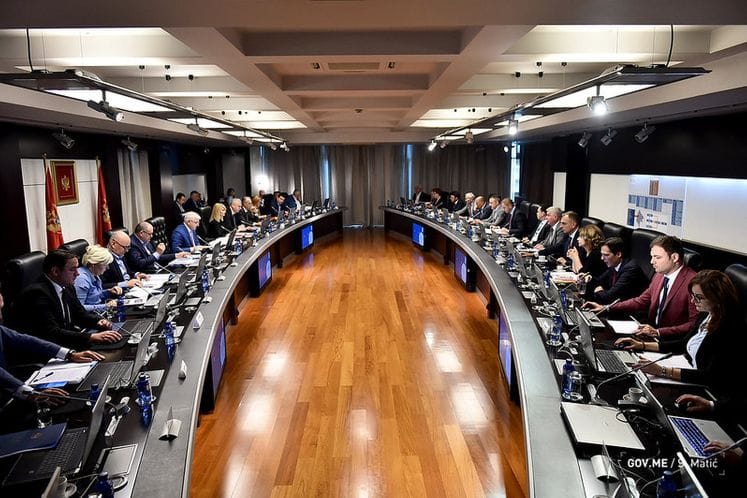- Government of Montenegro
Competitiveness Council considers UNDP document on...
Please note: The page below represents the archived content relating to the previous Government of Montenegro. Some of the information might be inaccurate or outdated.
Archive
Competitiveness Council considers UNDP document on coronavirus pandemic impact on Montenegrin economy

Published on: Jun 9, 2020 • 3:03 AM Author: PR Service
Podgorica, Montenegro (8 June 2020) – At its 10th session, chaired by Prime Minister Duško Marković, the Competitiveness Council get informed in an expanded composition, about the Final Draft of the Interim Report on Economic Assessment of the COVID-19 impact on the economic system of Montenegro and growth perspectives with recommendations, made by the Permanent Mission of the United Nations Development Programme (UNDP) in Montenegro in cooperation with the Chamber of Commerce of Montenegro.
The document, presented at the session by UNDP Resident Representative in Montenegro Daniela Gašparíková and coordinator of the document creation, South East Europe Public Sector Director with PricewaterhouseCoopers (PwC) Igor Lukšić, contains an economic assessment of the coronavirus impact on micro, small and medium enterprises and entrepreneurs, as well as on the perspective for economic growth in Montenegro.
The document states, among other things, that Montenegro entered the crisis caused by the coronavirus pandemic with real GDP growth in 2018 of 5.1% and 3.6% in 2019, an employment growth to a record level and with improved fiscal position, which includes reducing the fiscal deficit from 4.6% of GDP in 2018 to 3% in 2019, with the continuation of positive trends in the banking sector, mitigated external imbalances, but also increased public debt.
The document provides data on the consequences of the crisis caused by the coronavirus pandemic and on the measures taken by the Government to mitigate the consequences of the crisis on the economy and employees. At the session, it was noted that the conducted survey showed that the vast majority of employers consider the Government's measure on earnings subsidies to employees to be the most important.
The research conducted within the drafting of the document, showed that micro companies are most exposed to the negative impacts of COVID-19 micro companies, from the aspect of the number of employees of which, more than half completely stopped working. Large companies showed significantly greater resilience to the effects of the crisis, they in the largest percentage (38%) were fully operational, while 13% of them completely shut down.
"The COVID-19 crisis has once again shown that preserving (medium-term) macroeconomic and financial stability is the key for improving resilience to economic shocks and that such stability is a necessary condition for maintaining high levels of growth in the medium term," the document reads.
The document offers short-term, medium-term and long-term recommendations, which emphasize the need on developing new, alternative scenarios, as it is uncertain how the COVID-19 epidemic will develop, at least in the next 12 months, both in Montenegro and in Europe, as well as globally.
The President of the Council, Prime Minister Duško Marković, said, concluding the discussion on this item on the agenda, that the state did everything possible with two packages of measures to facilitate the consequences of the pandemic to the economy and employees.
"This time requires consent, solidarity and joint action of the social partners. The Government cannot solve all the problems alone," said the Prime Minister.
The Council was acquainted with the Innovated third Proposal of measures of the Steering Committee of the Union of Employers of Montenegro to support the economy, which states, inter alia, that it is necessary to provide state guarantees of at least 70% of loans to economic entities banned from working according to the temporary measures or who significantly reduced business volume; that guarantees of the Government and the Central Bank of Montenegro (CBCG) for placements of the Investment and Development Fund (IDF) and commercial banks should be determined in proportion to the market share of each bank, while limiting so given guarantees not to exceed 40% of total bank placements; that the Government and the Central Bank of Montenegro define, in advance, the terms of the arrangement with the IDF - the amount of a fixed interest rate, a grace period of at least 12 months and a repayment period of at least 36 months; that the IDF reduces the interest rates for existing loans, in relation to the degree of vulnerability of the economic entity; that the IDF and commercial banks provide an extension of the moratorium on repayment of credit obligations for economic entities, until the normalisation of business conditions, etc. The document also proposes a series of measures, including the release of economic entities from obligations to local governments, as well as the adoption of a special law that would regulate labour – legal relations in the current circumstances.
The Council also got acquainted with the Proposal of Montenegro Business Alliance for overcoming the issue of hiring the necessary labour force from other countries. This business association suggested that employers be allowed to contact the National Coordination Body for Communicable Diseases with requests for the engagement of specific persons from other countries, and that the National Coordination Body allows the arrival of these persons with appropriate evidence of a negative coronavirus test.
PUBLIC RELATIONS SERVICE OF THE GOVERNMENT OF MONTENEGRO
PHOTO AND VIDEO: https://flic.kr/s/aHsmNGvm5p
Related articles:
Parliament to decide on disposal of state property Mar 28, 2025
Press release from the Office of the Prime Minister Mar 28, 2025
Press release from the 74th Cabinet session Mar 27, 2025
Is this page useful?
